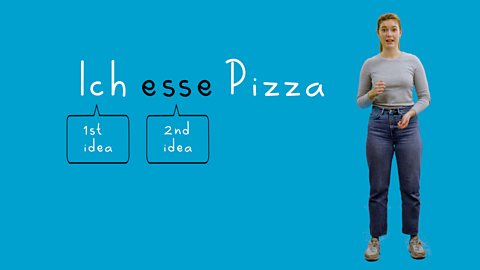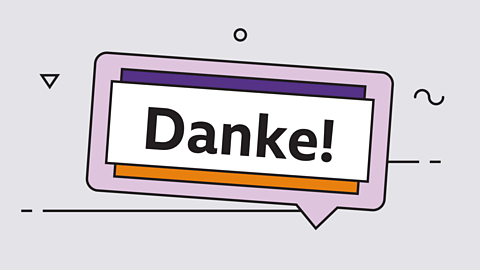You can use the present tense in German to say what you are doing right now, to talk about what you do on a regular basis, and to give facts.
The present tense : How to talk about what you do in German
When youãre talking about something you do or are doing right now, you need the present tense.
Letãs imagine youãre playing something. ãTo playã is spielen.
Ich spiele - I play
Du spielst - you play
Er spielt - he plays
The ending of the verb changes depending on who is doing the playing.
For spielen - ãto playã - and lots of regular verbs you take off the**-en**.
And for ich you add -e, for du you add -st and for er, sie, es you add -t.
Letãs try some other useful verbs like machen - ãto doã or ãto makeã.
Ich mache einen Tee- I make tea
Du machst Videos - You make videos.
Er macht Sport - He does sport.
Letãs try gehen -ã to goã.
Ich gehe in die Schule - I go to school.
Du gehst ins Bett - You go to bed.
Er geht ins Kino - He goes to the cinema.
Some verbs donãt follow this pattern.
Essen - ã to eatã - is irregular because you donãt just take the -en off.
Ich esse Fleisch.
Du isst Bananen.
Sie isst einen Apfel.
So in the present tense ich ends in -e, du ends in -st and er, sie, es end in -t.
And watch out for those irregular verbs!
How to form the present tense
To form the present tense, start with an infinitive. An infinitive is the basic form of the verb before any changes for tense or people are made. German infinitives usually end in ãeýå: spielen - to play.
Choose the correct pronoun for the person you are talking about (ich - I, du - you, er, sie, es - he, she, it).
Take the -en off the infinitive. This leaves the stem, which you can add various endings to. Look at the table below to see them.
Spielen - to play
| Pronoun | Stem | Ending | Example |
|---|---|---|---|
| ich | spiel- | -e | Check your connection, refresh the page and try again. - I play |
| du | spiel- | -st | Check your connection, refresh the page and try again. - you play |
| er | spiel- | -t | Check your connection, refresh the page and try again. - he plays |
| sie | spiel- | -t | Check your connection, refresh the page and try again. - she plays |
| es | spiel- | -t | Check your connection, refresh the page and try again. - it plays |

Er, sie and es can be replaced with a noun or a name:
- Check your connection, refresh the page and try again. - She plays video games and he plays basketball.
- Check your connection, refresh the page and try again. - Sarah plays video games and Michael plays basketball.

There are lots of regular verbs that follow this pattern:
- Check your connection, refresh the page and try again. - to listen
- Check your connection, refresh the page and try again. - to make/to do
- Check your connection, refresh the page and try again. - to go
- Check your connection, refresh the page and try again. - to drink
- Check your connection, refresh the page and try again. - to live
- Check your connection, refresh the page and try again. - to be called
Irregular and stem-changing verbs
Some verbs are irregular, meaning they donãt follow the same pattern as regular verbs. In German, the endings usually stay the same, but the stem often changes for the second and third person. The stem is what is left of the infinitive verb once you have taken the -en off the end.
Look at the tables below to see how to conjugate common irregular and stem-changing verbs.
Sehen - to see/to watch
- Take off the -en, leaving you with stem seh-
- For du and er/sie/es, the stem seh- becomes sieh-
- For example:
- Check your connection, refresh the page and try again. - She watches lots of films.
| Pronoun | Stem | Ending | Example |
|---|---|---|---|
| ich | seh- | -e | Check your connection, refresh the page and try again. - I see |
| du | sieh- | -st | Check your connection, refresh the page and try again. - you see |
| er | sieh- | -t | Check your connection, refresh the page and try again. - he sees |
| sie | sieh- | -t | Check your connection, refresh the page and try again. - she sees |
| es | sieh- | -t | Check your connection, refresh the page and try again. - it sees |
Lesen - to read
- Take off the -en, leaving you with stem les-
- For du and er/sie/es, the stem les- becomes lie-
- For example:
- Check your connection, refresh the page and try again. - My stepfather reads lots of books.
| Pronoun | Stem | Ending | Example |
|---|---|---|---|
| ich | les- | -e | Check your connection, refresh the page and try again. - I read |
| du | lie- | -st | Check your connection, refresh the page and try again. - you read |
| er | lie- | -st | Check your connection, refresh the page and try again. - he reads |
| sie | lie- | -st | Check your connection, refresh the page and try again. - she reads |
| es | lie- | -st | Check your connection, refresh the page and try again. - it reads |
Essen - to eat
- Take off the -en, leaving you with stem ess-
- For du and er/sie/es, the stem ess- becomes is-
- For example:
- Check your connection, refresh the page and try again. - He eats strawberries.
| Pronoun | Stem | Ending | Example |
|---|---|---|---|
| ich | ess- | -e | Check your connection, refresh the page and try again. - I eat |
| du | is- | -st | Check your connection, refresh the page and try again. - you eat |
| er | is- | -st | Check your connection, refresh the page and try again. - he eats |
| sie | is- | -st | Check your connection, refresh the page and try again. - she eats |
| es | is- | -st | Check your connection, refresh the page and try again. - it eats |
Sprechen - to speak
- Take off the -en, leaving you with stem sprech-
- For du and er/sie/es, the stem sprech- becomes sprich-
- For example:
- Check your connection, refresh the page and try again. - My cousin speaks Spanish.
| Pronoun | Stem | Ending | Example |
|---|---|---|---|
| ich | sprech- | -e | Check your connection, refresh the page and try again. - I speak |
| du | sprich- | -st | Check your connection, refresh the page and try again. - you speak |
| er | sprich- | -t | Check your connection, refresh the page and try again. - he speaks |
| sie | sprich- | -t | Check your connection, refresh the page and try again. - she speaks |
| es | sprich- | -t | Check your connection, refresh the page and try again. - it speaks |
Quiz
Find out how much you know aboutô the German present tense in this short quiz!
Complete the following phrases using your knowledge of the present tense.
Use the English translations to help you.
Where next?
Discover more from around Bitesize.
Word order in German
KS3 German

KS3 German
KS3 German

More on Grammar
Find out more by working through a topic
- count7 of 8

- count8 of 8

